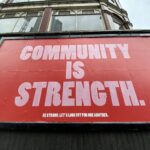September is National Recovery Month. Granted, Recovery Month is less well-known than Black History Month or Gay Pride Month. I almost missed it again this year, but for a friend who mentioned it. Last week in reflecting on the Celebration of Life for my brother John, I commented on the sense of community at the gathering of his friends and our family. More specifically I commented on the love in the room and how my ability to see, feel and give love continues to grow as I age.
For me, and others I knew at the gathering, this growing desire to love is fueled by recovery from addiction. This week I’d like to reflect on the recovery movement and its connection to the love at my brother’s celebration of life.
Truth be told, without the support of several Twelve Step fellowships, there wouldn’t have been a Celebration of Life for my brother. Had he not gone to A.A. twenty years ago, it is hard to imagine him living to be almost 74. Among those attending the gathering were ten or so cousins and other relatives including myself whose lives are profoundly improved by participation in Twelve Step recovery.
There were two small streets where we grew up, three blocks and not more than thirty homes total. Our little neighborhood experienced a number of serious mental health challenges and homes where alcoholism or other addictions impacted everyday life.
Without the Recovery Movement and the amazing power of Twelve Step recovery and spirituality, my brother’s childhood friend who rode the trains and hitchhiked to Haight Ashbury with him would not have lived to attend the Celebration. He proudly shared with me his 36 years in recovery. Haven’t talked with him in many years, and I was astounded and once again grateful beyond words that a near-death New York stock analyst, Bill Wilson, and a near-death doctor of proctology from Akron, Dr. Bob Smith, met and co-founded Alcoholics Anonymous.
Since that moment on June 10, 1935, the paths to recovery have broadened extensively. Through the Recovery Movement, individuals with substance abuse disorders and other addictions and their families have many choices for recovery and much-improved odds of returning to a healthy life. Sadly, there is still much denial and disdain for people with addictions, continuing the generations of shame, guilt and pain instead of recovery.
The Recovery Movement began in 2001 at a gathering in St. Paul Minnesota of people committed to a single goal: advancing a world where the shame and stigma of addiction no longer exists. The pioneers of this movement concluded it was important to affirm to the world that people indeed do recover from what today are called substance use disorders and are more commonly known as alcoholism, drug addiction and other addictions.
Recovery Month began in 1989 through a Presidential Proclamation. The federal government and early professionals working to demonstrate that long-term recovery was possible advocated for this celebration. The history of addiction treatment in the United States and the evolution of treatment for people with substance disorders and their families is detailed in an excellent video developed by NAADAC, the association of addiction professionals.
One of the leading organizations for this movement and for advocating for attention to recovery through Recovery Month is called Faces and Voices of Recovery. The name this organization has chosen is a powerful statement of its mission and intent. Shame and stigma persist because it is too easy to see people who are impacted by alcohol or drug abuse disorders as different than me or you. Growing up in a small town, everyone knew who the town drunk was and if there was a problem of alcoholism in a family. This was true for two of my great uncles who the family both pitied and tried to look after, seeing these men as suffering from a moral weakness, not a disease.
Faces and Voices of Recovery and Recovery Month has three aims: to make clear to every citizen that there is science behind proven practices that lead to long-term recovery, to demystify recovery by making more visible in communities people experiencing long-term recovery, and to celebrate and thank those service providers who make recovery possible.
On their website, Faces & Voices of Recovery sums up Recovery Month this way: “This yearly observance celebrates the millions of people in recovery and reminds us that behavioral health is essential to an overall happy life. Recovery Month is an opportunity to tell the world that prevention works, that treatment is effective, and that people can, and do, recover!”
I am grateful for the recovery movement and the new hope and joy that my family and millions of families and communities have experienced.




0 Comments